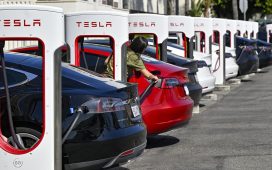“Because we were able to operate digitally, [the pandemic] also showed us a new way to operate that would be much more seamless for clients in the future,” Manheim President Grace Huang told Automotive News.
Manheim switched to all-digital auctions nearly a year ago amid the spread of COVID-19 in the U.S. The company has gradually allowed some buyers to return to physical auction lanes and has resumed running vehicles down lanes at more than half of its auctions. As of last week, the company is running in-lane, physical sales at 45 of its 76 U.S. auction sites, though the number can fluctuate based on local restrictions or guidelines, a company spokeswoman said.
Even before the switch to mostly digital sales began, Manheim had set in motion several initiatives to speed up and improve auction processes. But the shift last spring made the need more acute.
“Our systems were ready; they operated extremely, extremely well,” said Patrick Brennan, senior vice president of Manheim Marketplace. But “we recognize there were gaps in the way our clients were ready to interact with us during this whole process. And we had to make those adjustments.”
The company’s main goal? Making it easier for customers to interface with Manheim regardless of whether they’re bidding in-lane or online. Much of the effort centers on connecting Manheim customers with the right people to help them.
For example, virtual hubs for arbitration and virtual auction blocks have been created.
The hubs pull together Manheim’s top specialists in these areas, and certain issues will be routed to those teams first — regardless of whether the issue originated in a physical or digital venue.
Manheim also has invested in cloud technology to help ensure customer queries are routed to the correct people working in the company’s client response centers.
“We’ve been able to see some tremendous resolution times,” Brennan said.
Other processes are being streamlined. For instance, the company has centralized its title dispersing to an office in Carmel, Ind. That way, clients consigning vehicles can send their paperwork to one location vs. 30 or more depending on where they’re selling.
The overall investment is not focused on hiring more people, Brennan said. It’s more about identifying and supporting the right people to do the work.
The $100 million sum is larger than the amount Manheim spent in 2020 as it scrambled to respond to the pandemic. But it’s not unprecedented. Rather, it marks a return to years when major upgrades were made, Huang said.
“It kind of gets us back to historical levels of where we were when we were investing in big, big changes,” Huang said.








